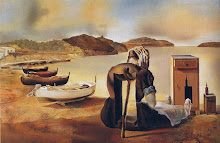35 That day when evening came, he said to his disciples, "Let us go over to the other side." 36 Leaving the crowd behind, they took him along, just as he was, in the boat. There were also other boats with him. 37 A furious squall came up, and the waves broke over the boat, so that it was nearly swamped. 38 Jesus was in the stern, sleeping on a cushion. The disciples woke him and said to him, "Teacher, don't you care if we drown?"
39 He got up, rebuked the wind and said to the waves, "Quiet! Be still!" Then the wind died down and it was completely calm.
40 He said to his disciples, "Why are you so afraid? Do you still have no faith?"
41 They were terrified and asked each other, "Who is this? Even the wind and the waves obey him!"
When you spend enough time with the four Gospel accounts in the Bible, you start noticing certain differences. While there certainly are differences in some story accounts, the specific differences I am talking about are the inflections and connotations that reflect differences in purpose, target audience, and author perspective. The Book of Matthew was written for the Jewish community, the Book of Luke was written for Gentiles; The Book of John was written as a theological argument, the Book of Luke was written as a historical account; the list goes on...
Something unique about the Book of Mark, the Gospel account which I have spent the most time with, is that it paints a particularly harsh picture of the disciples. Throughout the Gospel account, the disciples are seen as utterly clueless, and Jesus is portrayed as being quite annoyed with their lack of prescience.
It would be easy to dismiss the disciples' errors as the product of remarkable naiveté; they were simple people who just didn't have the most equipped of minds. While it is tempting to just say that the disciples were slow, that is clearly not the case, and not the cause of Jesus' frustration.
The disciples were, largely, composed of members of the Jewish "middle class," people who were not the heads of great households; but, were also far from being simpletons. Fishermen, carpenters, even a tax collector, were "working people," people who could make a good life for themselves if they worked hard. The literacy of the group is later testified to by the development of the scripture, and the apologies (arguments) that they would later take throughout the ancient world. Jesus was not frustrated with the disciples' lack of intelligence; He was frustrated with their insistence upon using reason and experience, to the exclusion of faith.
When particular events befall the disciples in Mark (many times throughout the Gospel), their first reaction is to ponder the normal meaning and consequences of those events against others they have lived through. When the storm rises in the passage above, the disciples reason instantly that they are going to die. This is not an ignorant projection; several of the disciples are fishermen who have seen such storms before. Jesus, during this mighty tempest, was catching a few "z's." When He is woken up, He immediately calms the storm and questions why the disciples would be afraid. The disciples, who now find themselves standing on the deck of a boat in calm waters, look like children who were scared of the boogey man until their daddy turned on the light for them.
Jesus' surprise at the disciples' defeatism continues throughout the Book of Mark (before Jesus revives the daughter of Jairus, he first asks the crowd why they are weeping for the dead child; at the feeding of the 4,000, Jesus is dumbfounded that the disciples still "do not yet understand"). If we say that Jesus' anger is at the disciples' stupidity, then we miss the point. The disciples are behaving like any sane people would (being scared when a typhoon hits their small boat, crying at a funeral for a little girl, getting flustered when they can't feed all of the guests at an event); except, of course, if such "sane" people knew that God was with them.
One of the primary lessons for the disciples is that the rules of existence change when God is with you, and when you believe that fact to be true. When God is with you and you believe it to be true, miracles occur and there is little reason to be afraid. When God is with you and you believe it to be true, then the frustrations of our own limitations as people become less important than His lack of limitations. When God is with you and you believe it to be true, tragedy can never be the final scene; death is always trumped by life in the end.
The lesson on the boat, in the book of Mark, and in the cubicles here in Midian is that amidst the frustrations and the fears of frail human existence, we must remind ourselves that God is with us. We can be rational, we can be intelligent, we can be educated; but, if we do not have faith, then we won't make it past the storm to see the calm. If we depend less on our good sense, and more on Christ's presence, then the hazards in front of us may start to seem a lot less dire.

No comments:
Post a Comment